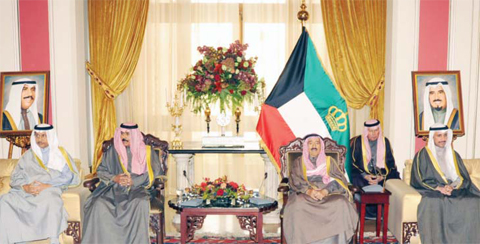Court orders opening more ballot boxes for recount
 KUWAIT: HH the Amir Sheikh Sabah Al-Ahmad Al-Jaber Al-Sabah (second right), HH the Crown Prince Sheikh Nawaf Al-Ahmad Al-Jaber Al-Sabah (second left), National Assembly Speaker Marzouq Al-Ghanem (right) and HH the Prime Minister Sheikh Jaber Al-Mubarak Al-Hamad Al-Sabah (left) attend a luncheon banquet hosted by HH the Amir yesterday.
KUWAIT: HH the Amir Sheikh Sabah Al-Ahmad Al-Jaber Al-Sabah (second right), HH the Crown Prince Sheikh Nawaf Al-Ahmad Al-Jaber Al-Sabah (second left), National Assembly Speaker Marzouq Al-Ghanem (right) and HH the Prime Minister Sheikh Jaber Al-Mubarak Al-Hamad Al-Sabah (left) attend a luncheon banquet hosted by HH the Amir yesterday.KUWAIT: Opposition lawmaker Ali Al-Deqbasi yesterday submitted a draft law calling for a fundamental change to the existing electoral constituencies, which would have an important impact on the results of elections if accepted. Deqbasi proposed that electoral districts be based on the six existing governorates in the country, with four of the governorates electing 10 MPs each and the remaining two electing just five lawmakers each to make up the 50 members of the National Assembly.
According to the bill, residential areas in the Capital governorate will make up the first constituency, which will elect 10 MPs. Each eligible voter will be allowed to select a maximum of four candidates. Hawally, Farwaniya and Ahmadi governorates will make the second, third and fourth constituencies respectively, and each of them will elect 10 lawmakers. Also, each voter in these districts can select a maximum of four candidates. The last two districts will be that of Mubarak Al-Kabeer and Jahra governorates, with each electing five MPs and every voter allowed to select up to two candidates.
Changing of electoral constituencies or the voting system can be done through a law, but the number of MPs in the Assembly can only be altered only through an amendment of the constitution, which is a very complicated process. The Kuwaiti constitution has never been amended since it was issued in 1962.
Changing the electoral law, particularly the voting system, was one of the top priority issues during the election campaign last month, especially by opposition candidates. Most opposition groups had boycotted the Dec 2012 and July 2013 parliamentary elections to protest the government's unilateral change of the voting system. Some opposition groups still boycotted last month's polls for the same reason, but a majority of the opposition groups returned to the fray and won nearly half of the 50 seats. The opposition says that the change in the electoral law in 2012 divided the country on tribal, sectarian and family lines, and is preparing proposals to amend it.
Meanwhile, the constitutional court yesterday ordered the opening of a number of ballot boxes of last month's polls from the fourth constituency to examine petitions against the results. The court on Sunday ordered the opening of several boxes from the second and third constituencies. The court will sit again today and in late January to issue its rulings on this issue.
The rapporteur of the Assembly's public funds protection committee MP Abdulwahab Al-Babtain said the panel has set its priority list, and it will start discussing alleged wrongdoing in distribution of state farms, state funds invested in Kuwait and Gulf Link Co (KGL) and the issue of Kuwait Investment Authority (KIA). Other issues to be discussed include the Shell contract and the proposed sale of 50 percent of government-owned companies. Babtain said the committee will also discuss the Jaber Stadium, Jaber Causeway, the Kuwaiti loan to Russia and other issues.
By B Izzak










